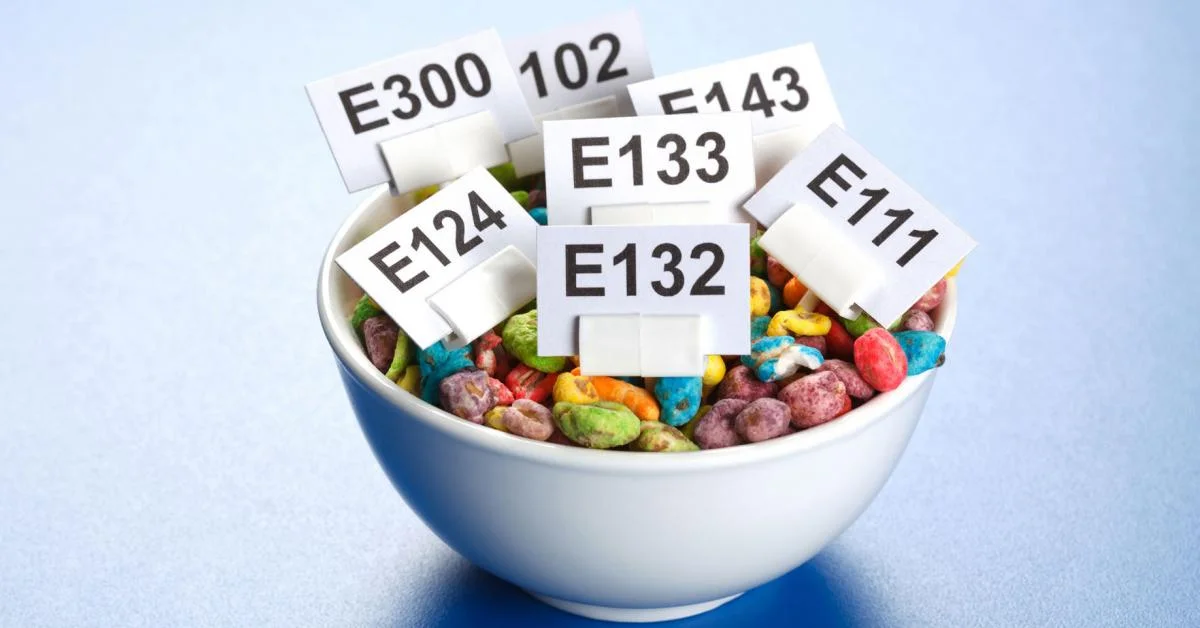Sep 7, 2023
Food additives, dyes, and preservatives are all around us and are a topic of much debate. There are concerns about the potential health effects of these substances, particularly when it comes to children with ADHD. Let's explore what the research tells us. Have you ever wondered why many of our food products contain additives, dyes, and preservatives? These substances are added to enhance food's flavour, texture, and appearance. Dyes are used for colour, while preservatives prevent spoilage and extend the shelf life of food.
As a nutritionist, I often get asked if there is a connection between certain substances and ADHD symptoms.
It's important to note that not all food additives are controversial, and some are necessary to ensure that our food stays fresh and safe to eat. For centuries, salt has been utilized as a natural preservative to prevent meat from spoiling, for example. However, more than 10,000 additives are approved for use in our food, some of which haven't been evaluated in decades!
When it comes to food additives, there are several common ones that have been studied for their potential link to ADHD symptoms. These include:
Artificial food colours are dyes added to food to enhance their colour or make them look more appetizing. Some common artificial food colours for food packaging include Red 40, Yellow 5, and Blue 1.
Preservatives: These are substances that are added to food to prevent spoilage and extend shelf life. Some common preservatives to look out for on food packaging include sodium benzoate, sodium nitrite, and BHA/BHT.
Flavour enhancers: These are substances that are added to food to enhance their taste. One common flavour enhancer to be aware of is monosodium glutamate (MSG).
The research on this topic is quite mixed, but some studies do suggest a connection.
For example, a study published in The Lancet in 2007 found that children who consumed a mixture of food dyes and the preservative sodium benzoate were more likely to display hyperactive behaviour. The study was controversial at the time, but it sparked a lot of discussion about the potential risks of food additives.
Since then, other studies have been conducted, with some finding a link between food additives and ADHD symptoms and others not finding anything significant. So, what does all of this tell us? Well, it suggests that there might be a link between food additives and ADHD symptoms, but the evidence is still not conclusive. It's possible that some children are more sensitive to these substances than others and that more research is needed to identify these children and understand why they might be more susceptible.
For example, a study published in the Journal of Attention Disorders in 2012 found that pre-schoolers who consumed food with artificial food colours and/or the preservative sodium benzoate showed significantly more hyperactive and impulsive behaviour than those who consumed a placebo. Another study published in Paediatrics in 2013 found that eliminating food additives from the diets of children with ADHD resulted in significant reductions in hyperactive and impulsive behaviour.
Let’s find out a little more about sodium benzoate. Sodium benzoate is a preservative that is commonly used in the food industry to prevent the growth of bacteria, yeast, and fungi. It's often added to acidic foods like fruit juices, soft drinks, pickles, condiments, and sauces. Sodium benzoate is considered safe by regulatory agencies like the US Food and Drug Administration (FDA) and the European Food Safety Authority (EFSA), and it's generally recognized as safe (GRAS) when used in appropriate amounts. However, concerns about its potential health effects have been raised, particularly in combination with other food additives.
Some experts have suggested that sodium benzoate may cause DNA damage or have negative effects on the immune system, but the evidence on these potential risks is still limited and inconclusive. It's worth noting that some people appear to be more sensitive to sodium benzoate than others and may experience allergic reactions or other adverse effects as a result of consuming foods that contain this preservative.
Overall, while sodium benzoate is considered safe in small amounts, it's still a good idea to read food labels carefully and try to limit your intake of this and other food additives as much as possible, particularly if you or your child has been diagnosed with ADHD.
There has been a lot of coverage in the media about MSG. So, what exactly is it? MSG is a flavour enhancer that is often used in processed foods to enhance their taste. It's a form of glutamic acid, which is a naturally occurring amino acid found in many foods, including tomatoes, cheese, and meat. The US Food and Drug Administration (FDA) has classified MSG as generally recognized as safe (GRAS), and the European Food Safety Authority (EFSA) has also concluded that it is safe for consumption.
MSG is typically added to foods like soups, frozen dinners, and snack foods to give them a savoury or umami taste. It's also sometimes used in Asian cuisine, particularly in dishes like stir-fry and ramen noodles. In recent years, there has been controversy surrounding MSG. Indeed, many of my clients feel that they may be sensitive to MSG and experience symptoms like nausea, headaches or flushing when they consume it even though studies have not found a clear link between MSG and these negative health effects.
When it comes to ADHD specifically, there have been some studies that suggest a potential link between MSG and symptoms of hyperactivity and inattention. For example, a study published in the Journal of Paediatrics in 2018 found that children with ADHD who consumed high levels of dietary glutamate (including MSG) showed higher levels of hyperactivity and impulsivity than those who consumed lower levels of glutamate. Another study published in the journal Nutritional Neuroscience in 2019 found that MSG consumption was associated with higher levels of inattention and hyperactivity in children. Although the discoveries are intriguing, it is important to keep in mind that they are derived from observational research and do not establish a cause-and- effect relationship. It's also possible that other factors may be influencing the link between MSG and ADHD symptoms. For example, children who consume a lot of MSG may also be consuming other types of food additives or have other dietary habits that could be contributing to their symptoms.
In the meantime, many parents of children with ADHD choose to limit their children's intake of food additives, dyes, and preservatives as a precautionary measure or in response to observed changes in mood or behaviour. It can be difficult since these substances are prevalent in our food supply.
So, what can you do if you're concerned about the potential risks of food additives? Start by carefully reading food labels and avoiding foods containing artificial colours, flavours, and preservatives. Focus on whole foods like fruits, vegetables, whole grains, and lean proteins, and cook as much as possible from scratch. I work with my clients to help them make informed choices about their diet and reduce their overall exposure to these substances. In my free private Facebook Community – ADHD Nutrition and Diet Community, I share weekly, easy-to-prepare recipes and hold weekly LIVE Q&As for our members.
Let’s find out a little more about sodium benzoate. Sodium benzoate is a preservative that is commonly used in the food industry to prevent the growth of bacteria, yeast, and fungi. It's often added to acidic foods like fruit juices, soft drinks, pickles, condiments, and sauces. Sodium benzoate is considered safe by regulatory agencies like the US Food and Drug Administration (FDA) and the European Food Safety Authority (EFSA), and it's generally recognized as safe (GRAS) when used in appropriate amounts. However, concerns about its potential health effects have been raised, particularly in combination with other food additives.
Some experts have suggested that sodium benzoate may cause DNA damage or have negative effects on the immune system, but the evidence on these potential risks is still limited and inconclusive. It's worth noting that some people appear to be more sensitive to sodium benzoate than others and may experience allergic reactions or other adverse effects as a result of consuming foods that contain this preservative.
Overall, while sodium benzoate is considered safe in small amounts, it's still a good idea to read food labels carefully and try to limit your intake of this and other food additives as much as possible, particularly if you or your child has been diagnosed with ADHD.
There has been a lot of coverage in the media about MSG. So, what exactly is it? MSG is a flavour enhancer that is often used in processed foods to enhance their taste. It's a form of glutamic acid, which is a naturally occurring amino acid found in many foods, including tomatoes, cheese, and meat. The US Food and Drug Administration (FDA) has classified MSG as generally recognized as safe (GRAS), and the European Food Safety Authority (EFSA) has also concluded that it is safe for consumption.
MSG is typically added to foods like soups, frozen dinners, and snack foods to give them a savoury or umami taste. It's also sometimes used in Asian cuisine, particularly in dishes like stir-fry and ramen noodles. In recent years, there has been controversy surrounding MSG. Indeed, many of my clients feel that they may be sensitive to MSG and experience symptoms like nausea, headaches or flushing when they consume it even though studies have not found a clear link between MSG and these negative health effects.
When it comes to ADHD specifically, there have been some studies that suggest a potential link between MSG and symptoms of hyperactivity and inattention. For example, a study published in the Journal of Paediatrics in 2018 found that children with ADHD who consumed high levels of dietary glutamate (including MSG) showed higher levels of hyperactivity and impulsivity than those who consumed lower levels of glutamate. Another study published in the journal Nutritional Neuroscience in 2019 found that MSG consumption was associated with higher levels of inattention and hyperactivity in children. Although the discoveries are intriguing, it is important to keep in mind that they are derived from observational research and do not establish a cause-and- effect relationship. It's also possible that other factors may be influencing the link between MSG and ADHD symptoms. For example, children who consume a lot of MSG may also be consuming other types of food additives or have other dietary habits that could be contributing to their symptoms.
In the meantime, many parents of children with ADHD choose to limit their children's intake of food additives, dyes, and preservatives as a precautionary measure or in response to observed changes in mood or behaviour. It can be difficult since these substances are prevalent in our food supply.
So, what can you do if you're concerned about the potential risks of food additives? Start by carefully reading food labels and avoiding foods containing artificial colours, flavours, and preservatives. Focus on whole foods like fruits, vegetables, whole grains, and lean proteins, and cook as much as possible from scratch. I work with my clients to help them make informed choices about their diet and reduce their overall exposure to these substances. In my free private Facebook Community – ADHD Nutrition and Diet Community, I share weekly, easy-to-prepare recipes and hold weekly LIVE Q&As for our members.
Join with the link: https://www.facebook.com/groups/sonutritioncommunity








